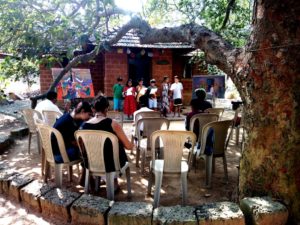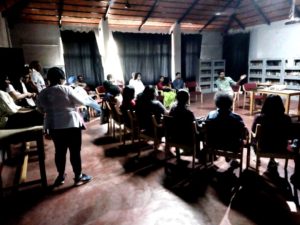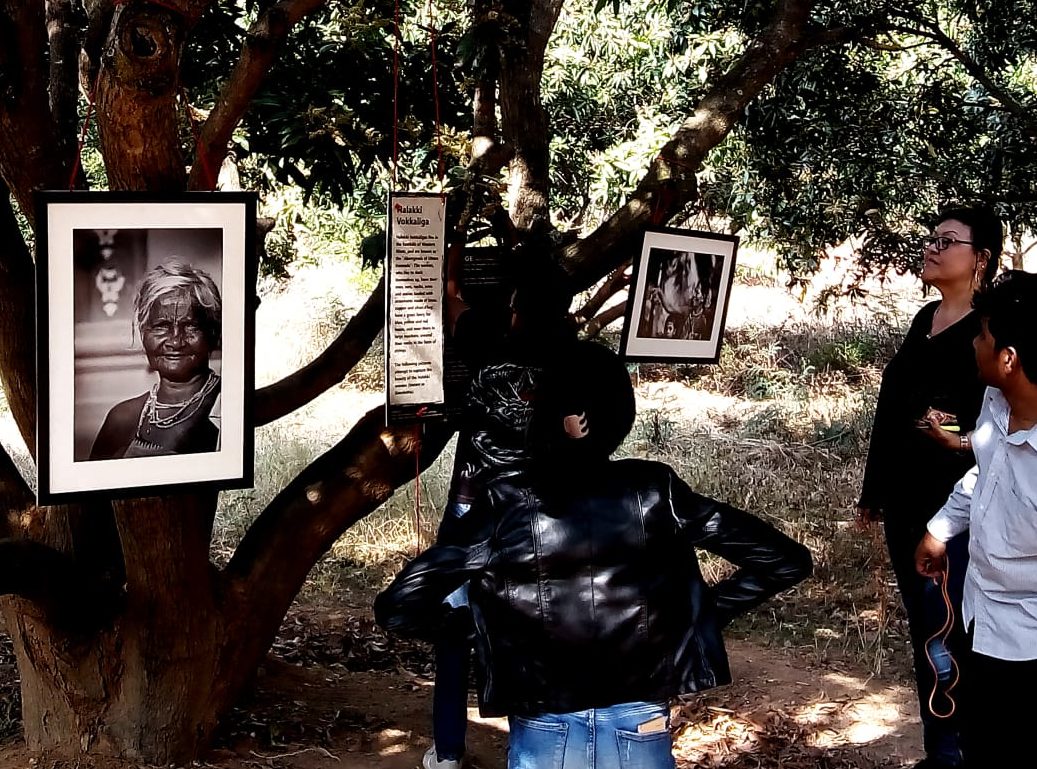Amidst the gathering war clouds and widening ideological divide in society, a reaffirmation of human values
Early on Saturday morning, March 2, a taxi drove up Visthar’s leafy avenue carrying six of Salman Sheriff’s canvasses. When the paintings were put up a few minutes later, it was the start of what was to be an unusual day. One of the works was on land rights and farmers’ issues, important democratic issues, and that indeed was the theme of the festival.
Artists Unite, an informal pan-national grouping, had come up with the idea of having a national artists’ convention on March 2 and 3 across the country to make a statement against hatred and war-mongering, and stand up the Constitution of India and democratic processes. Events in Delhi, Kolkata, Hyderabad, Mumbai, Bangalore, Agra, Dharwad, Nagpur and several other places took place simultaneously.
Visthar, an NGO focused on justice, peace, gender and children’s rights, hosted the Bangalore leg of the event at its sylvan campus. A simple lamp-lighting ritual in an ancient well on the Visthar kicked off the event that featured poetry, play-readings, dance and dramatic performances, film screenings and music.

The event kicked off at Mandala – one of four venues within Visthar – with children from Theatre Lab doing a piece on the Constitution and exploring its meanings in the context of what it meant for children. Among the other performances at Mandala were poetry recitals by Shanti and Priyanka from the Aravani Art Project, a reading of the Adivasi protest poetry of Dopadi Singhar by Ramneek Singh, and a reading of the play Eidgah ke Jannat, written by Abhishek Majumdar – it was recently proscribed by the Rajasthan government for controversial comment. The reading of Eidgah featured Bangalore’s renowned theatre personality Arundathi Nag. Later in the evening, there was a performance entitled ‘377A: A Close Reading’, which had the audience reading chosen parts of the 377A judgment.
Meanwhile, the film screenings had kicked with a showing of Our Gauri and In the Shadow of the Fallen Chinar. Later, one of the makers of the second film, Shawn Sebastian, too interacted with viewers talking about the making of his film. The third and final screening was ofSikkidre Shikari Ildiddre Bhikari, and was followed by a talk on the importance of free artistic spaces by Suresh Jayaram of No.1, Shanti Road.
Among the dance performances featured was 6 Feet Land and Us by Anuradha Venkatraman and her troupe. Dramatic performances that the audience was witness to included ‘A Pair of Glasses’ by Your Truly Theatre and a powerful piece on farmers’ issues by students of Visthar’s own drama school, Visthar Ranga Shale.
As the sunny afternoon waltzed into a more pleasant evening, the music began with Gauley Bhai and their unique brand of folk rock, followed by a lyrical rendition of Kuvempu, Nisar Ahmed and Kabir by the ethereal MD Pallavi. Sandhya Vishvanathan’s extremely electronic music had everyone captivated with its unusual sounds that through its powerful lyrics sought to talk about a wide range of social issues. And then it was time for the wildly popular Thermal and a Quarter and their ‘Bangalore rock’ that had the audience in raptures. Mantalai’s unique brand of electric folk music followed and the night was brought to an end by Michael Dias and Abhijit Tambe’s guitar duo and a rousing rendition of a song on freedom by Kaya Rao Shetty.

Now, what was Artists Unite Karnataka really all about? Was it merely a gathering of a few liberals who then took turns in talking to each other about the same values of liberalism, constitutionality and tolerance that they do anyway? Or was it a powerful statement for values that while enshrined in our Constitution are endemic to the continued co-existence of humankind? The answer is simple. Amidst the gathering war clouds, jingoistic slogans and a widening ideological divide in society, it is a shaking of hands and a reaffirmation of human values. It might be easy to dismiss with a cynical comment by those who merely wish to peacefully co-exist. Revenge and retribution are after all the order of the day. But what cannot be forgotten is the everlasting power of love and tolerance, which is really what has held the nation and, indeed, all of humanity, together for centuries. So while climate change and environmental challenges threaten us all, many choose to practice the politics of ‘othering’ that seeks to lay claim to land and nation for a few even as the earth creaks and groans under us.
[Photographs courtesy: Shamya Dasgupta]


Comments are closed.